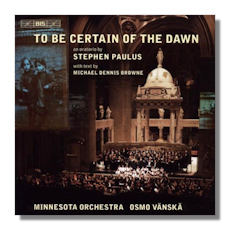
The Internet's Premier Classical Music Source
Related Links
- Paulus Reviews
- Latest Reviews
- More Reviews
-
By Composer
-
Collections
DVD & Blu-ray
Books
Concert Reviews
Articles/Interviews
Software
Audio
Search Amazon
Recommended Links
Site News
 CD Review
CD Review
Stephen Paulus

To Be Certain of the Dawn
- Barry Abelson, cantor
- Elizabeth Futral, soprano
- Christina Baldwin, mezzo-soprano
- John Tessier, tenor
- Philip Cokorinos, bass-baritone
Minnesota Chorale & Boychoir
The Basilica Cathedral Choir & Cathedral Choristers (Basilica of St Mary, Minneapolis)
Minnesota Orchestra/Osmo Vänskä
BIS CD-1726 59:13
This project has a fascinating origin. Commissioned as a gift for Temple Israel from the Basilica of St. Mary as a commemoration of 60 years since the liberation of Nazi camps and 40 years since the Vatican issued a document that condemned blaming the Jewish people for the death of Christ. Local poet Michael Dennis Browne and acclaimed composer Stephen Paulus collaborated on this oratorio, with the work debuting at the Basilica in 2005 under the baton of Osmo Vänskä. Cast in three sections, the work calls for immense forces as well as traditional Jewish elements (the ram's horns that open the work and a cantor among them). Osmo Vänskä is better known for Beethoven and Sibelius, but he conducts a moving performance all the same. These choral forces are some of the finest of their type (professional, children's, and church) that you could ask for, and the singing makes the whole disc worthwhile.
Reading some other reviews, I've seen complaints that Paulus' Romantic style and numerous gentle sections do not accurately represent the Holocaust in musical terms. This is nonsense. There are plenty of driven, even heartbreaking moments, painted ably in text by Browne. But as the liner notes point out, the purpose of this work was to foster an awareness of a shared ownership between the faiths of these horrific events. Within this work, we find contrition, reflection, and even moments of profound peace. Cantor Barry Abelson works wonderfully with the other soloists in doing what he does as a part of his faith; that is, proclaiming the word on behalf of his people. As already mentioned, the combined choirs bring this music to life and create a sense of occasion, as well as a sense of real emotional depth. Paulus' writing recalls other great masterpieces that commemorate war, especially Ralph Vaughan Williams' Dona nobis pacem. The use of a children's choir recalls Britten, a staunch pacifist and a terrific writer for young voices. But Paulus' is no mere imitator of the English choral tradition. His beautifully inventive use of the orchestra and the hushed, intensely focused singers makes this oratorio something both uniquely modern and rooted in the past.
BIS' sound is less focused than usual, but recording in a cathedral is always tricky business. I am fully aware that this review is filled with my own opinions. I am a Roman Catholic who grew up taking the Jewish holidays off in my school district. This music is close to me, because it affects so many of us so profoundly, regardless of our faith. But you don't have to be a churchgoer to appreciate the genuine feeling behind this music, sincere as it is. While this will never be a cornerstone of the repertoire or a work for everyone, I imagine that those with an interest in how we express history in music – to say nothing of those who collect modern choral music – will want this.
Copyright © 2015, Brian Wigman





















